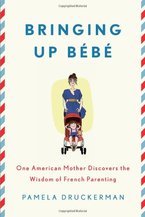 Below are some random observations and insights from my first 4 months of parenthood. These are just one man's experiences, and I recognize all babies are different. Things you can forget about when you have a baby: -Sleeping. I've had such intense sleep deprivation that I can literally feel my IQ dropping tens of points. I can feel the slowness of my thinking and the dropping of thoughts/memories and conversely a speed-up of my CPU with just a few hours of rest. Coping strategy: write everything down. -Going out without a care in the world -Exercising -Free time -Hobbies -Getting work done in one sitting uninterrupted -Going out with friends -Eating out at restaurants -Shopping -Seeing movies -Eating food when it's warm -Eating food at regular times -Showering regularly -Doing anything at an absolute time schedule in sync with the rest of the world. You had a meeting or call at 1pm? Too bad, baby don't give a shit. With naps and feeding times changing day to day, it's impossible to plan anything in relation to the outside world. Tough luck. Things you'll be busy with: -Continual adaptation every minute of every day. That thing that you finally mastered after 2 weeks and which worked yesterday to get him to sleep/eat/not cry? Too bad, not gonna work today. Gotta start from scratch. -Continual mystery solving. Why is he crying? Not eating? Not sleeping? Sleeping too much? Is it too hot? Too cold? What to wear? Millions of new decisions and investigations every day, and everyone out there has a different opinion. -Continual experimentation and experiment running. It's like daily science lab. If I change this variable today, will it make him sleeper better or worse? The problem is it's not real science because there's no control population to compare with, and there's no way of knowing what effect the passing of time has since he's constantly changing/growing. If I did nothing, would he be just as fine? -Learning what I was like when I was little. Developing extreme sympathy for my parents who had to deal with me if I was this difficult. -The power of singing. Singing and music makes everything better and solves all problems. -Silly play. Everything is worth putting in the mouth, exploring, and playing with. -Finding laughter in the smallest things. Who knew spoons and cups could be so fascinating? -Finding wonder in the smallest things. Any little thing can amaze. Especially if it's red or makes sound or music. -Amazement at every new experience. First time going outside! First time peeing up the wall! First time hearing live music! Every little moment can be appreciated and enjoyed anew through this little person's eyes. -Developing a special connection with your new family. It's such hard work, and it takes such patience and teamwork with your partner. But now you feel like a king of your little family, something that it's on you to protect and nourish and be proud of. No pressure.
0 Comments
 I enjoyed reading Playing Scared (all about conquering stage fright through deliberate practice), and I recently heard a Freakonomics podcast all about the original researcher who coined the term and researched how experts practice. So I decided to check out the book discussed in the podcast, Peak: Secrets from the New Science of Expertise by Anders Ericsson and Robert Pool. I greatly enjoyed it, and it was interesting as a counterpoint and further specialization of many of the ideas discussed in Malcolm Gladwell's Outliers (which popularized, though not quite the same way Ericsson intended, the "10,000 hour rule"). I loved the takeaway message of Peak: while talent can give an initial boost, everyone has the potential to develop skills in whatever area they desire as long as they put in the hard work and practice in the right way. The examples of how people who were "bad singers" purposefully learned and were "certified" to have perfect pitch were inspiring. Intro Gifted aren't born Perfect pitch is about training Brain very adaptable until 6 years old 1 the power of purposeful practice Have specific short term goal for each practice session which is objective and which would show performance improvement (play song 3 times in a row with no errors Concrete baby steps Break down goal Give task full attention Immediate feedback 2 harnessing adaptability The greater the challenge the greater the change 3 mental representations Visual images Training is specific for each skill Allow more efficient processing of info Experts have more mental representations Recognizing and responding to patterns 4 the gold standard Amount of solitary practice time per week is biggest differentiator Deliberate practice is purposeful with well defined goal and helped by expert coach Requires full attention on specific goal 5 principles of deliberate practice 6 principles in everyday life Find a good teacher Need to focus while practicing To get past plateau start using different training ideas 7 road to extraordinary Desire to play is motivation for kids Parents praise achievement Adults can develop perfect pitch from proper training 8 what about natural talent Innate characteristics play smaller role than assumed Practice more important in long run than initial advantage of talent Recognize and develop potential in everyone 9 where we go from here Focus on building skills not knowledge through training  I wanted to read some books about parenting, and the first one I picked up was one that I heard a lot about: Bringing Up Bébé: One American Mother Discovers the Wisdom of French Parenting by Pamela Druckerman. I ended up enjoying it immensely, not only for its parenting tips but also for the descriptions of Paris and life in France. It brought back such special memories of travel there. Sleeping through night Crying it out Waiting Saying no, that's not in the plan for today Marshmallow study Delayed gratification Best strategy is distraction Playing alone Being firm When throw tantrum say no and tell story about life Baking lessons from young age Give independent assignments Wait and let cry for a few minutes If adults busy then kids wait How affected by nanny? How not to spoil? Meal plan from 3-4 mo like adult schedule Can stave off between meals with stroller or sling On demand feeding only for first couple months Discovering and learning Don't try to speed up stages of learning Not about better parenting Not about competition or head starts Awakening and discovery Just being a child Just expose child to different experiences for pleasure Firm frame of limits Can't do anything or eat from fridge whenever want Firm rules for eating, sleeping, and tv. Other areas can let them go. Set limits but provide choices within those limits. Kid chooses clothes at home but parents for outside. No tv, only DVDs, but kid chooses Dvd. Don't try to spare them frustration Assume children can understand what u say from early age and explain what doing to them and what u need them to do and assume they will do it Daycare You have the right to do this, you don't have the right to do this Prohibitions strict and given with reason 4 course fresh cooked meals at daycare Toys confined to room and put away at night Mothers shouldn't be enslaved by kids The perfect mother doesn't exist Leave child alone to play When ur off, ur off Stop trying to push towards next stage of development with tons of toys and books Enjoy adult conversations and activities Rid yourself of guilt of not being perfect Force kids to say hello, good bye, thank u, please Punishment if don't Civility and politeness Food Only at meal times or 4pm gouter and never at park or activities Real not processed food Kids order from adult menu No kids eat just one food First solids are puréed veggies not grains Parents must teach how to eat everything and keep proposing foods even if reject Don't panic or make a big deal out of food refusal Try offering same food prepared in different ways Ask kids to describe flavors, crunchiness, mouth feel Play games with different foods to decide which sweetest, acidic, etc, blind taste foods to identify which is which In France there is no such thing as kids food For family dinners kids must try everything on the table. Adults and kids eat the same meal in multiple courses. Discuss the food as dinner is cooked and during dinner. Sweets are also in cadre: have their place and can be enjoyed at special events or once a week; don't pretend it doesn't exist Allow kids to have moments where rules don't apply but the parents are the ones who decide when those moments are Chocolate is nutritional fixture but is not over eaten Sweets at gouter but not dinner; hot chocolate and cookies Authority Make no stronger and more convincing Speak with conviction Drop ambivalence and be certain of own authority Fully felt no Believe in it Evening is parents time. You've had your time. This is bedtime and now parents time. That's it. No more attention. Go to bed. Kids not ruling or in charge Parents are authority and King Don't explain or provide reason for everything u need them to do. Just say that's what ur doing and that's it. Clear authority and leadership important for kids to feel confident in parents To build cadre, Spend a lot of time telling kids what's permissible and not Use the language of rights: you don't have the right to hit Joe Still be polite to kids and say please Fixed and coherent system of rights. Kids do have some rights. I do not agree with u doing X Make eye contact with kid when speaking The more spoiled a child is, the more unhappy The big eyes: to demonstrate disapproval of child behavior Develop complicity with kids Teaching not policing means less yelling Strict about a few key things but lax about everything else Respect for others and adults, physical aggression are zero tolerance areas At bedtime kids must stay in their room but within room can do what they want To have authority need to say yes most of the time Point of parental authority is to authorize kids to do things not block them Teach the child to ask beforehand Give child space and chance to obey Say 1,2,3 then has to do what u want No must be irrevocable and firm C’est moi qui decide Autonomy Sleep away camps from age 4 Learn independence and resilience Parents don't need to always protect and smooth out harm Let children live their lives and explore themselves to figure things out themselves Trust kids to take care of selves Don't live in world of worst case scenarios Slow to mediate arguments between kids Don't tattle tale culture Rely on self rather than complaining to parents or school Praise not always good. Praise kids for saying interesting things or doing something well. Not every job well done is worthy of praise Focus on the negative or finding problems instead of constantly praising when doing fine Grade against ideal but curve Excessive praise messes up motivation When kids fail, don't give positive feedback but delve into what went wrong Kids have own emotional life Let kids stretch a bit and do something where they can fail Age 6 is threshold where kid needs to be able to do anything an adult can Trust and respect ur children Children r not repositories for parents ambitions or projects for parents to perfect They are their own people with own preferences and ideas Weeklong trips to grandparents |
Archives
June 2024
Categories
All
Subscribe |
 RSS Feed
RSS Feed
